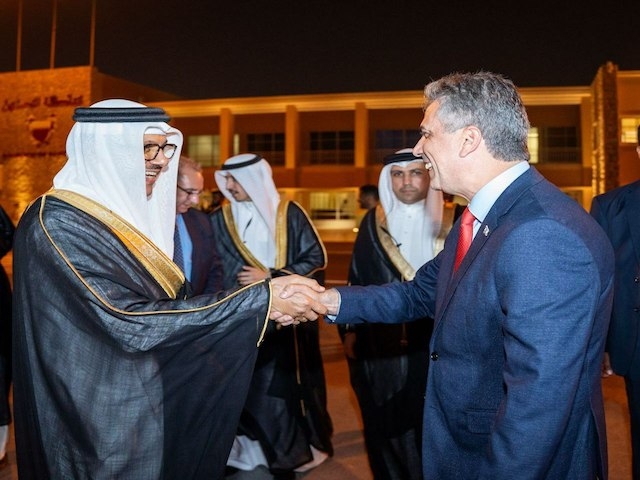In the shadow of recent upheavals—notably the "Libyan affair" and civil unrest in Bahrain's capital, Manama—a notably congenial meeting took place yesterday between Israeli Foreign Minister Eli Cohen and his Bahraini counterpart, Foreign Minister Abdullatif Al Zayani. The diplomatic encounter unfolded amidst the backdrop of simultaneous developments: the Libyan foreign minister's expulsion from her home country following the revelation of her meeting with Cohen, and the largest prisoners' revolt in Bahraini history, accompanied by demonstrations in Manama. Remarkably, these contentious issues were not on the diplomatic agenda during Cohen's discussions in Bahrain.
The ambiance of the meeting was described as warm and cordial, underscoring the burgeoning ties between Israel and Bahrain. Both ministers focused their conversation on deepening bilateral relations and promoting tourism between the two countries. In a light-hearted moment, Knesset Member (MK) Amit Halevi, chairman of the Israel-Bahrain Friendship Association, playfully "scolded" Al Zayani for the scarcity of Bahraini tourists in Israel. Cohen, embarking on his inaugural visit to Bahrain, expressed his elation about the constructive dialogue, despite the sweltering heat of up to 45 degrees Celsius in the Gulf nation.
Today, Cohen's agenda is a hectic one, commencing with a visit to the American naval base in Bahrain. This will be followed by meetings with the Bahraini monarch and other key ministers. He will also participate in the second housewarming (Hanukat Habayit) celebration at Israel's embassy, which was inaugurated less than a year ago. Originally slated for August 7, the visit had been postponed, ostensibly for "technical reasons," though the real cause was more likely related to Minister Itamar Ben Gvir's controversial ascent to the Temple Mount. Both Saudi Arabia and Iran, the latter having strained relations with Bahrain, are keenly monitoring the visit's proceedings.
#Israel Foreign Affairs Minister Eli Cohen arrived in Bahrain today on an official two-day visit.The minister was received by Dr. Abdullatif Al Zayani,Minister of Foreign Affairs,Dr. Sh.Abdulla bin Ahmed Al Khalifa, pic.twitter.com/x6Grk1M9ny
— Ahdeya Ahmed AlSayed (@AhdeyaAhmed) September 3, 2023
Meanwhile, prominent Bahraini political commentator and expert contributor for the Washington Institute for Near East Policy, Abdulla Aljunaid weighed in, suggesting that the nascent relationship between Israel and Bahrain remains fragile. A peace activist and proponent of Arab-Israeli dialogue, Aljunaid advised Israel to make a choice: to remain isolated or embrace its regional role by fostering stronger ties with its Arab neighbors—including the Palestinians. Aljunaid asserted that Palestinian acceptance remains the linchpin for broader Arab-Israeli reconciliation.
Blunt in his observations, Aljunaid said, "Your stance on Palestinians may not matter to you, but it matters to the Arab countries you seek relations with." He emphasized that Israel must internalize its role as a regional player, a role that requires engaging both its neighboring states and the Palestinians. Aljunaid also commented on the divisive state of Israeli society, a dangerous phenomenon he's been following closely since 2011. He expressed that Israel's challenges transcend any single political leader and address deeper societal issues, including the alarming conditions within Israel's Arab sector.
Israeli Foreign Minister Eli Cohen has landed in Bahrain for his inaugural Abraham Accords visit
— i24NEWS English (@i24NEWS_EN) September 3, 2023
i24NEWS Correspondent @_bastienborie reports live with the latest #TheRundown | @benitalevin pic.twitter.com/Ae4hLzhIRG
Aljunaid's forthright statements underscore the complexity of Israel's geopolitical landscape—a dynamic that isn't just about alliances, but also involves soul-searching about the country's regional role and its responsibilities to its own diverse population. In a region undergoing rapid change, both Israel and Bahrain find themselves navigating uncharted diplomatic waters. Yet, despite the contentious backdrop, the recent ministerial meeting offers a glimmer of optimism, pointing toward a future where cooperation might replace conflict.


